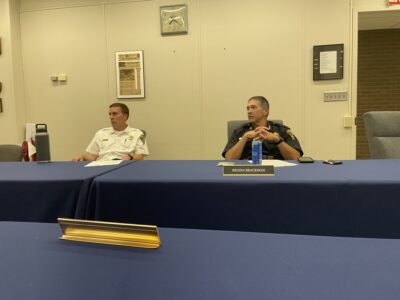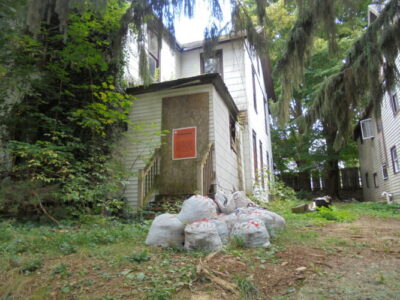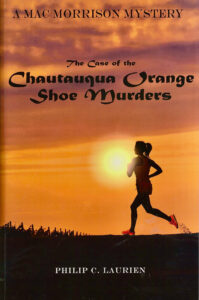GOP Lawmakers File Wetlands Lawsuit Brief

Assemblyman Andrew Molitor, R-Westfield, speaks during a news conference earlier this year.
Ten legislative Republicans are following former Assemblyman Andrew Goodell’s lead by filing an amicus curie brief opposing the state’s Freshwater Wetlands Act changes that took effect this year.
The brief is being filed by Assemblyman Andrew Molitor, R-Westfield, and Adam Fusco of the Fusco Law office in Albany, with slightly versions of the same brief filed in each of four lawsuits challenging the Freshwater Wetlands Act: one led by the Chautauqua Lake Property Owners Association, one led by the Chautauqua Lake Partnership, one led by the Business Council of New York State and one led by the village of Kiryas Joel.
In addition to Molitor, Republicans signing onto the newest amicus brief filed in the lawsuits are Sen. George Borrello, R-Sunset Bay, Assemblyman Joe Sempolinski, R-Canisteo; and Assembly members Phil Palmesano, John Lemondes, Joe Angelino, Chris Friend, Brian Maher, Stephen Hawley and Andrea Bailey. The legislators say they should be allowed to weigh in on the lawsuits because they were elected to consider and vote on legislation that includes environmental bills. They argue the state DEC’s expansion of authority under the amended Freshwater Wetlands Act infringes on elected officials’ authority.
“The new DEC Wetland Regulations, as applied to any land or water regardless of size, completely disregard Article 24 of the Environmental Conservation Law and are inconsistent with the Environmental Conservation Law as a whole,” Molitor and Fusco wrote in their brief. “Lands and waters that do not fit under the Environmental Conservation Law’s Article 24 definition, like many areas in and around lakes, including many parts of Chautauqua Lake that abut steep hills, forested land, parks, etc., cannot arbitrarily be defined by regulation as freshwater wetlands. The DEC is without the authority to regulate entire lakes as freshwater wetlands. As such, your Amici invite this court to annul, declare null and void and enjoin the DEC from enforcing the new Wetlands Regulations.”
The Republican lawmakers say the 2022 Freshwater Wetlands Act amendments were meant to replace the previous wetland map the state was using and give the DEC authority over freshwater wetlands whether they were previously mapped or not. But, they say, the DEC has expanded the size and scope of its regulatory authority based upon a misapplication of the 2022 amendments. Goodell made a similar argument in his brief, saying the definition of freshwater wetlands was amended to eliminate the requirements that wetlands be shown on a freshwater wetlands map, exclude tidal wetlands and adds a reference to wetlands less than 12.4 acres in size that are of unusual importance. Goodell argued that means legally there should be no substantive change in the statutory definition of freshwater wetlands for wetlands that are larger than 12.4 acres in size.
“However, the amendments were never intended to change the definition of a freshwater wetland as contained in ECL § 24-0107(1). In fact, the statute, and its 2022 amendments, limit DEC Article 24 jurisdiction to freshwater wetlands alone because the intent of the Legislature was to preserve, protect, and conserve all freshwater wetlands,” Molitor and Fusco wrote in their brief.
Writing in particular regarding the Chautauqua Lake Partnership’s lawsuit against the DEC, Molitor argues that the DEC is disregarding years of precedent by making a jurisdictional determination that some lakes, like Chautauqua Lake, are freshwater wetlands by determining the lakes, including Chautauqua, possess characteristics of “unusual importance,” according to an affidavit filed by DEC official Lisa Czechowicsz. Molitor and Fusco say that reading is incorrect for several reasons.
“Chautauqua Lake, at approximately 13,000 acres, is not a land or submerged land commonly called a marsh, swamp, slough, bog, or flat supporting one or more of eight subcategories of aquatic or semi-aquatic vegetation; it is not a land or submerged land containing remnants of any vegetation that is aquatic or semi-aquatic and that has died because of wet conditions over a sufficiently long period and it is not a water that overlies either. Further, it is not a land or water that is less than 12.4 acres, so the eleven categories of unusual importance do not apply. Therefore, except for the areas of the lake that are substantially enclosed by aquatic or semi-aquatic vegetation (as previously mapped), the DEC should not regulate any area of Chautauqua Lake under ECL article 24,” Molitor and Fusco wrote.
Judge Richard Platkin of state Supreme Court in Albany County recently allowed amicus briefs filed by the village of Lakewood, Bemus Point Business Association, Riverkeeper Inc. and Save the Sound. Both the state and the plaintiffs have been given until Oct. 17 to respond to those briefs. Platkin hasn’t yet ruled whether or not to allow Molitor’s brief, or Goodell’s brief, to be entered into the record.





